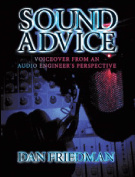 I live in what I think (and many will agree) is one of the most beautiful parts of the USA. However, all that lush forest and beautiful foliage brings with it pollen, allergens, and air so thick you can watch it as it blows by. For most people, allergy season is merely a nuisance. For voiceover talent, it can be frustrating, frightening and costly.
I live in what I think (and many will agree) is one of the most beautiful parts of the USA. However, all that lush forest and beautiful foliage brings with it pollen, allergens, and air so thick you can watch it as it blows by. For most people, allergy season is merely a nuisance. For voiceover talent, it can be frustrating, frightening and costly.
Learning to deal with allergies was never a concern for me until a few years ago. I never suffered from allergies until moving to the mountains and even then it took a few years before they took hold of me. Spring of 2010 was by far the most difficult season I’d ever had. I was unable to hear well and I definitely did not sound like myself. As someone who earns a living from having sharp hearing and a consistent vocal sound, this was definitely a problem. While I was able to work, I did not feel confident in what I was hearing and I did not like how I was sounding.
I used the neti pot three times a day. I ate locally produced honey. Before and during sessions, I ate spicy food, brought jalapeño peppers into the booth with me and put mentholatum ointment under my nose. I took anti inflammatory medication, OTC Phenq allergy and cold medicines and finally, after six weeks of suffering, got a nasal spray prescription from my doctor. Thankfully that prescription cleared things up for me. Other than a few weeks during mid summer and mid winter, I’ve taken it ever since. While I still felt the effects of allergy season this year, overall it has been much better.
I was lucky. To my knowledge, I didn’t lose any voice work and my production work was solid. The sinus pain and pressure was bad, but the most difficult part was the fear that I would lose work and the lack of confidence I had in my abilities during this time. I know there are many voiceover talent who suffer from allergies and all of the symptoms that come with them. I tried everything before turning to a prescription for relief, but in the end it was the only thing that worked for me.
If you are an allergy sufferer and a voice talent…what works for you?
 Good communication is a key to success in all relationships. Often miscommunication and misunderstandings between people occur because they simply don’t know how to “speak the same language”. I’m not talking about the difference between English and Chinese. I’m talking about technical audio terms. In the business world, nearly every type of business, has a name for everything they do. The recording and voiceover world is no different.
Good communication is a key to success in all relationships. Often miscommunication and misunderstandings between people occur because they simply don’t know how to “speak the same language”. I’m not talking about the difference between English and Chinese. I’m talking about technical audio terms. In the business world, nearly every type of business, has a name for everything they do. The recording and voiceover world is no different. Why am I writing this blog post? Because I want to remind you to take the time to stop and consciously ask yourself, “why?”. “Why?” is a question that we often forget to ask ourselves as we go about our day or do our jobs. Typically, we either know the answer (or think we do) based on past experience or we simply do what we always do out of habit. We also have a tendency to do things because someone told us to, but without asking ourselves why doing what they said is the right thing to do. Taking the time to ask and answer this simple question can be very enlightening. It can also help you make better decisions about gear, deliveries, production and maybe even your life… but today, we’ll just focus on your career.
Why am I writing this blog post? Because I want to remind you to take the time to stop and consciously ask yourself, “why?”. “Why?” is a question that we often forget to ask ourselves as we go about our day or do our jobs. Typically, we either know the answer (or think we do) based on past experience or we simply do what we always do out of habit. We also have a tendency to do things because someone told us to, but without asking ourselves why doing what they said is the right thing to do. Taking the time to ask and answer this simple question can be very enlightening. It can also help you make better decisions about gear, deliveries, production and maybe even your life… but today, we’ll just focus on your career.


